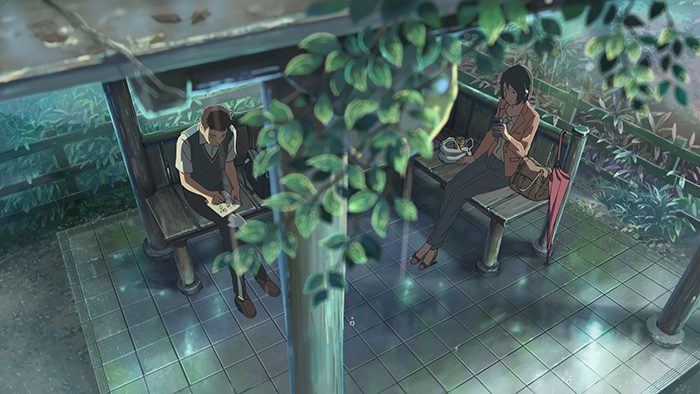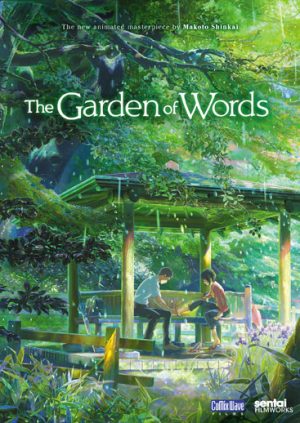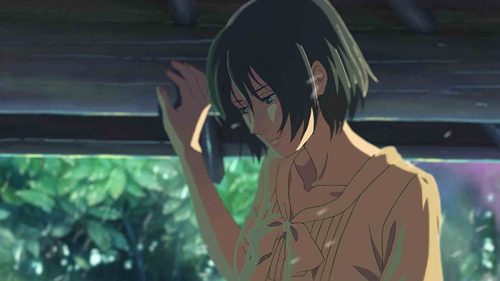
Kotonoha no Niwa (The Garden of Words) is a movie directed by the esteemed Makoto Shinkai. In this 46 minute film, Shinkai conveys the chance meeting between an aspiring shoemaker and an enigmatic woman.
By showing each character’s inhibition and lack of mobility, Makoto Shinkai creates a need, a necessary lesson to be learned from one another. Through these obstacles, the Garden of Words “manifests,” a special location very close to their hearts.
In this article, I will briefly describe each character and their inhibitions. By doing so, I want to show how the location and film, Kotonoha no Niwa (The Garden of Words), peels back social constraints and norms, granting characters the freedom to walk on their own.
Meeting in the Middle: Takao Faces His “Adulthood”

The Garden of Words revolves around two characters and their odd relationship, however, for the first half, our perspective comes from Takao. Takao feels disconnected from school life; his mind is always elsewhere.
After meeting Yukari, he has a misconception. Quoting from the official dub, “She lives in a world where people work, and that place is a world away from where I am.” As if to reinforce his “love-struck” perspective, there is an intercut during his monologue, allowing viewers to see through his eyes.
Glistening in the sunlight, Yukari brushes her hair back, smiling back at the “camera.” Cutting back, Takao finishes his monologue, “...She represents every secret that world holds. Right now, I know only two things. One, she looks at me like I’m just another 15-year old kid… Two, [shoemaking] is what I’m meant to do, the only thing that’s going to get me out of this place and into that world full of secrets.”
Takao looks forward, his belief is adulthood will give him his freedom. With that context, Yukari lights the way forward, a bright sun he cannot look at directly. Takao thinks positively of adulthood, but his inexperience makes him miss the signs and troubles that come with growing up.
Up until this point, Yukari has remained both unnamed and unknown, her past mysterious. However, even if her reasons are unstated, viewers can make an educated guess. After all, even if she doesn’t explain herself, she’s in the “Garden of Words.”
Meeting in the Middle: Yukari Faces Her “Youth”
While we know Takao skips school when it rains, it’s odd for an office lady to be available at the drop of rain. In their second meeting, Yukari is seen drinking beer in the morning. When questioning about her drinking habits, Takao expresses concern. To answer back, she shows chocolate—not exactly a healthy combination. Her attire contrasts her actions.
Thus, after Takao’s monologue, there is plenty of reason to be skeptical. The movie follows up with scenes at her apartment, the first real look into her life. From the visuals, we can guess at her life. Trash bags lay on the bedroom floor, unsorted clothes on her bed, and empty beer cans by her feet. In contrast to Takao who is neat and shown to work multiple jobs (later), Yukari feels like a kid struggling to be an adult.
However, this young boy still thinks she’s perfect. Despite how she’s without work and disorderly. Despite how dropping her makeup—a small mistake—brings her close to tears. Despite, how she’s ostracized due to (wrongful) rumors at Takao’s school, Yukari has a place she belongs.
At the Garden of Words, both Yukari and Takao meet in the middle both physically (the location) and emotionally. In this special place, both of them feel each other’s approval: a boy who wants to quickly be an adult and a woman who wishes to return to her youth.
Nature as Support: Emotions as Shown Through the Environment
Each character shares a fixation but a different barrier. For Takao, he sees his age as an obstacle. His obligations as a student hold him back from pursuing his career as a shoemaker. School, for him, is a prison. For Yukari, her age gives her an oppressive responsibility. Now that she’s older, she desires freedom from her problems. Thus, both have their reasons to escape towards a special place.
The Garden of Words is a location outside of social constraints and norms, the very pressures of society. In this place, barriers like age and profession can be ignored. There are no outside eyes, no judgment for their escape. Nature itself foretells their relationship.
Rainfall brings them together, reinforced visually and explicitly in the film. When their feelings become clear, the clouds part. At the lake, pink flowers are shown above their heads, blossomed during the season.
Even during summer when they can’t see each other, it allows them to focus on their lives, giving viewers a chance to see their progress—because of each other. Visually, the movie makes this place almost magical where their emotions are brought together and enhanced by nature. The Garden of Words is nurturing just as each character is to each other.
Final Thoughts

Despite its limitations—or perhaps because of them—The Garden of Words has a subtlety that is purposefully crafted. By entangling characters in relatable problems, this film makes an interesting study in how a perfect setting can bring out new sides to ourselves and unlock our hearts.

